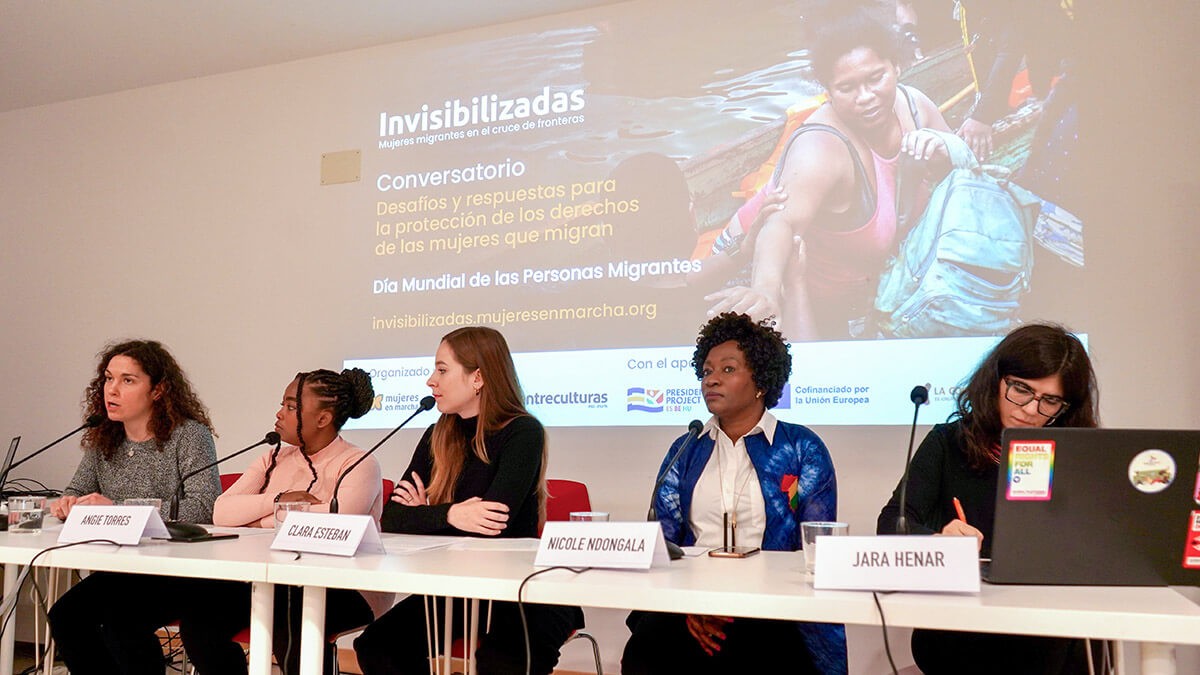Entreculturas and Alboan warn about the harsh violence suffered by migrant women

On the occasion of the International Day of Migrants, which is commemorated today, 18 December, the NGOs Entreculturas and Alboan presented the new interactive digital version of their latest report, " Invisibilized. Migrant women crossing borders", launched in the framework of their joint campaign, "Women on the move".
The publication, in which the Jesuit Migrant Service of Spain (SJM), the Ignacio Ellacuría Foundation and Loiola Etxea have also participated, is based on the reality of women in the migratory contexts of Central America and the Spanish Southern Border in order to make visible the violation of fundamental rights and the perpetuation of violence they face. This research has focused on all phases of the migration process: origin, transit, borders and destination countries.
"Migrant women are dignified, valuable people with a lot to say if the current migration system did not place them as victims". With these words, Clara Esteban, Advocacy technician at Entreculturas and moderator of the space where the report was presented, denounced the lack of protection suffered by migrant women. "A change of course is needed because current migration policies push women to take deadly routes and this needs to be talked about". The new digital version of the report, which has the support of the European Union and La Coordinadora de ONG, seeks to "make the content of the research visible to the public in an interactive and accessible way in order to reach more people and raise awareness of this reality".
Sara Diego, co-author of the report and Alboan Advocacy technician, pointed out that "in the face of the invisibility of migrant women's rights, we put their stories, their demands and dreams at the centre of the debate, while denouncing the visible and invisible, physical and symbolic walls that mark their migratory experiences". Sara affirmed that the report also "puts on the table the responsibility that the migration policies of the USA, Europe and Spain have in perpetuating the violence they experience, which annually ends the lives of thousands of women". Finally, Sara stressed that one of the main conclusions of the research is that "gender-based violence against women is a characteristic shared by all migration contexts".

Nicole Ndongala, Director General of the Karibu Association, reflected on the title of the report: "Invisibilised? Because society wants to make us invisible. We migrant women are not invisible, we are resilient women with experience and strengths who have gone from being victims to being women in action". In addition, Nicole pointed out how in Spain "there is discrimination and racism that comes from above, which is systematic and institutional", also affirming that "there is no decent integration design and that the work with migrant women must be redesigned to stop infantilising us, because all we want is to participate in society".
Angie Torres, human rights activist with the Jesuit Refugee Service Latin America and Colombian refugee in Ecuador, wanted to emphasise the need for migration policies with a gender perspective: "These policies would help to reduce the risks we experience at each stage of migration and to broaden the forms of protection by taking into account our condition as women, which would generate more relevant reception and reception conditions with integration programmes, support networks and humanitarian aid adapted to our circumstances". In turn, Angie told how "her vocation of service" and her experience as a refugee woman make her want to "support the construction of social changes that achieve fairer and more equitable models of integration and coexistence for all people".
Jara Henar, expert in migration at Alianza por la Solidaridad and member of the monitoring group of the European Pact on Migration and Asylum, explained how "European migration policies make migrant women invisible, treat them as victims, criminalise them or infantilise them by including them alongside children. Furthermore, it treats migrant women as a single woman and not as the millions of migrant women there are, with their differences and similarities". Regarding the imminent new European Pact on Migration and Asylum, she warns that "there is a general regression of rights, also including very vague concepts such as "crisis" or "force majeure" that will allow each member state not to apply existing legislation".
Finally, Clara Esteban took the floor to end the discussion by presenting the main demands and recommendations of the report "Invisibilised", including the need to put an end to the stereotypes that portray migrant women as victims. A change for which it is essential that "the Global North stops making stopgap policies and tackles the structural causes of migration, thus recognising its responsibility in the situations that push women to leave their countries of origin








